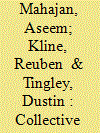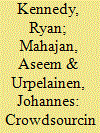| Srl | Item |
| 1 |
ID:
183147


|
|
|
|
|
| Summary/Abstract |
International climate negotiations occur against the backdrop of increasing collective risk: the likelihood of catastrophic economic loss due to climate change will continue to increase unless and until global mitigation efforts are sufficient to prevent it. We introduce a novel alternating-offers bargaining model that incorporates this characteristic feature of climate change. We test the model using an incentivized experiment. We manipulate two important distributional equity principles: capacity to pay for mitigation of climate change and vulnerability to its potentially catastrophic effects. Our results show that less vulnerable parties do not exploit the greater vulnerability of their bargaining partners. They are, rather, more generous. Conversely, parties with greater capacity are less generous in their offers. Both collective risk itself and its importance in light of the recent Intergovernmental Panel on Climate Change report make it all the more urgent to better understand this crucial strategic feature of climate change bargaining.
|
|
|
|
|
|
|
|
|
|
|
|
|
|
|
|
| 2 |
ID:
175017


|
|
|
|
|
| Summary/Abstract |
Measuring energy access in developing countries involves much more than simply recording whether or not households are connected to the grid. Both international organizations and scholars now recognize the importance of reliable electricity supply for achieving positive development outcomes. Yet, measuring reliability is much more difficult than measuring the existence of connections. We propose an economical croudsourcing method for measuring reliability, and compare this method to energy monitor data for 122 households over 12 months. The results suggest that, while far from perfect, crowdsourcing provides a reasonably accurate method for monitoring the reliability of access over time, especially when modeled as a non-linear relationship. We apply these findings to model energy reliability in a broader group of villages across Uttar Pradesh, India, demonstrating the existence of disparities between urban and rural reliability and seasonal fluctuations in reliability. The system laid out in this study can be utilized by government and non-government organizations to quickly and cheaply monitor energy reliability.
|
|
|
|
|
|
|
|
|
|
|
|
|
|
|
|